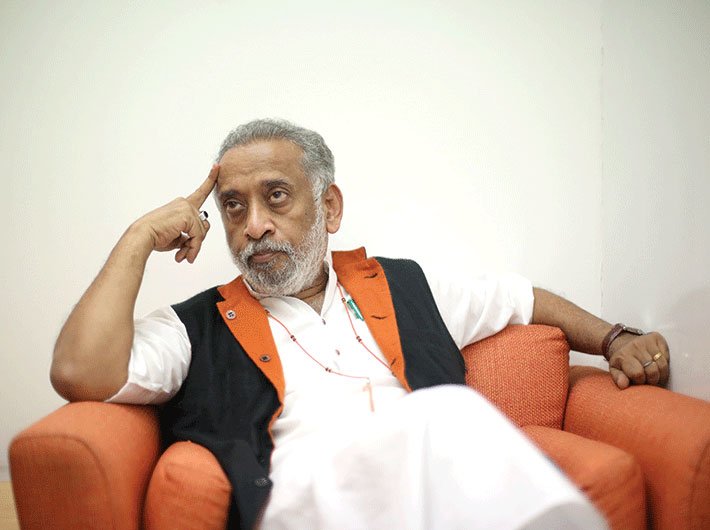Interview with Dilip Cherian, Director, Perfect Relations, and image management guru
How would you describe the post-truth phenomenon in the Indian context?
Speaking in the context of post-truth, we have a live instance of it in the demonetisation playing out now in India. This involves three things: politics, people and perception, and all three have immediate and direct relation to the concept (of post-truth). It was clear that demonetisation was the handiwork of a personality. The other people who were important to this decision were the RBI governor (Urjit Patel) and the finance minister (Arun Jaitley), both of whom receded to the background. They were no longer seen as purveyors of truth and there was a sense that the two were less critical to the process (of demonetisation). This all illustrates the concept of post-truth, as it plays out in the Indian context.
If the truth is to be told, then the two (Patel and Jaitley) had to be involved in the details of decision-making and also in post-demonetisation. That hasn’t happened. The RBI governor hasn’t spoken for one month. The finance minister has only spoken the obvious and he hasn’t spoken with as much conviction as expected from someone who should be responsible for the nitty-gritty of the decision.
I will tell you the post-truth about the politics of demonetisation. Initially, demonetisation, which was essentially a political decision, came in the garb of a decision about the nation’s security, tackling Pakistan, making sacrifices for the country, and so on. The narrative changed quickly to a move towards Digital India and an attempt to create a cashless economy, which shows basically that demonetisation was meant to keep power centralised and ensuring that any other proposition of power-sharing was eroded financially.
And the perception…
The post-truth management of perception on demonetisation was evident in the way in the first 10 days it remained shrouded in desh bhakti slogans, gradually changed to a dialogue between the hostile forces of the poor and the rich. Then it became an exchange between those who believed it was time for change and those who still believed in the old system.
How does this, the post-truth of demonetisation, play out in a country as diverse as ours?
The concept behind the move was that prime minister Narendra Modi is pushing a big change, and that it’s necessary in a country which moves slowly. One way of looking at it is from an angle where he is right: that India has the ability to leap-frog. It has leap-frogged from colonialism to democracy, from a micro-capitalist economy to socialism and from a social welfare system to full-fledged capitalism, from waiting for telephone connections to cellphones in every hand. India is a country that can absorb large changes. It’s the post-truth which insists that India can change only slowly.
The second thing about which Modi is right is about the extent of counterfeit and fake currency, which has, in fact, turned out to be much larger than the official estimates.
In a country where more than 50 percent people are under 40 years of age the possibility of absorbing technology is the highest. Here, too, the thought process is right.
What are the inherent dangers of this situation?
There are dangers. For example, Indians (from different states) have differing levels of sense of security about keeping cash. It’s generally said that, since partition, Punjabis would put their money in three things: property, gold and cash, in equal portions. But the people in Assam or, say Bengal, may not have the same preferences.
What kind of political forces stand to gain in the post-truth world?
Political parties which are centralised or led by strong leaders would stand to gain. Parties where real discussions take place, stand to lose because in the discussion, post-truth gets closer to real truth. However, the verdict on Modi’s post-truth will be out on December 30. The year 2017 will tell us whether he emerged victorious on this or not.
How do you look at the increasing use of social media for spreading fake news and absolute lies?
In the age of social media, fake news unfortunately draws real audiences. Though fake news has been around for long, the web has made it much easier for it to spread – often much faster than the reports that debunk it, by which time the damage is already done. It’s the nature of the beast. Publishers are driven by the urge to publish quickly than by the need for factual accuracy. Readers too don’t read stories nearly as often as much as they click on them. Everyone wants to be the first to break a story to an unsuspecting audience or be the first in their circle to share what they deem as “news”.
Not everyone knows the value of news, yet everyone with a social media account is a “publisher”, with perhaps lesser sense of responsibility than traditional or mainstream news media. And the idea of anonymity has emboldened people with vested interests or hate-groups and others with an agenda to constantly test how much they can get away with. In many cases, that’s a lot. For the largely undiscerning audience, fake news is “real” as we saw recently in ‘stories’ about a nano GPS chip being implanted in every '2,000 currency note. It was untrue, but the story spread within minutes, while the official denial didn’t get as much traction.
What will be the impact of this on the mainstream news media?
The advent of social media has meant that the mainstream news media are not in control of information as before. There is too much information and opinion on the net, but perhaps very little gatekeeping or filtering to separate facts from lies. Traditional media find themselves having to choose between being the fastest with the news, the most popular and the most credible. Very few can manage all.
aasha@governancenow.com
(The interview appears in the December 16-31, 2016)

